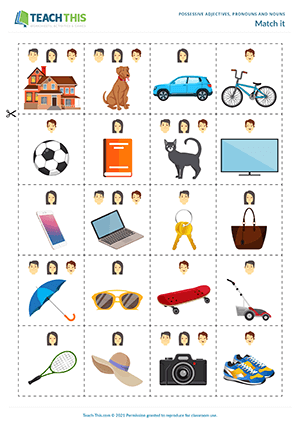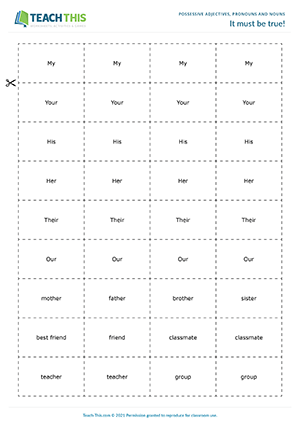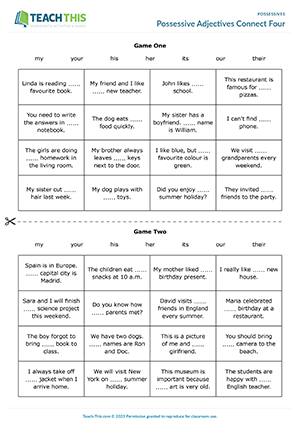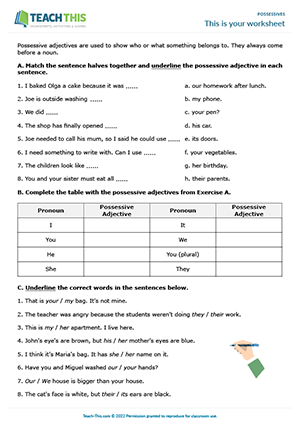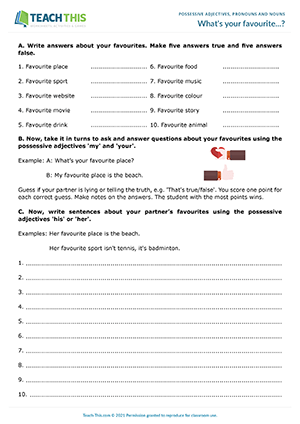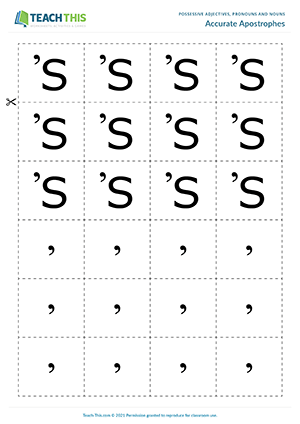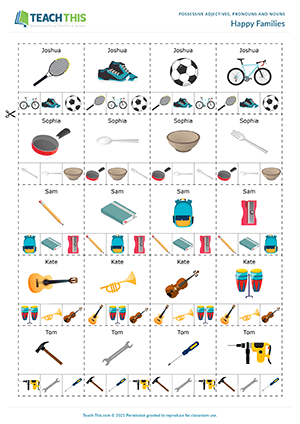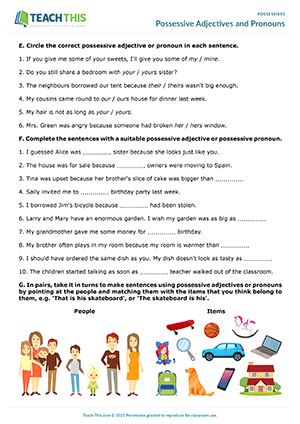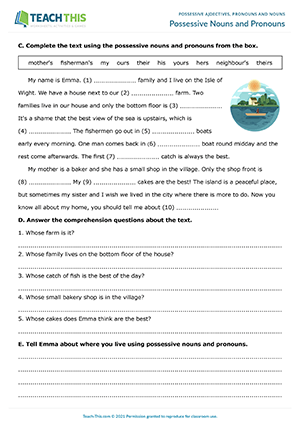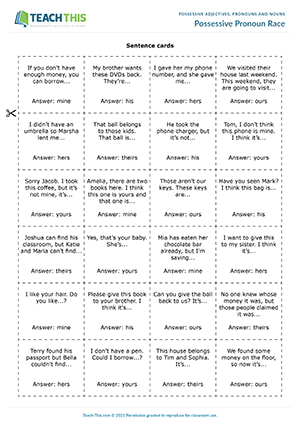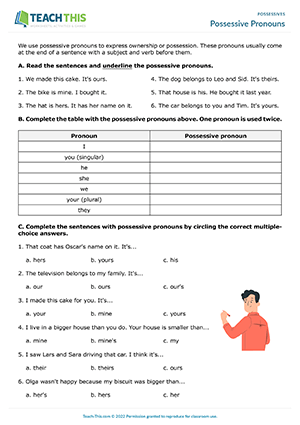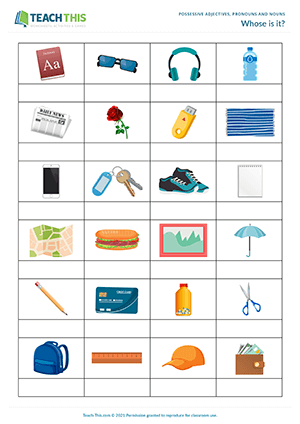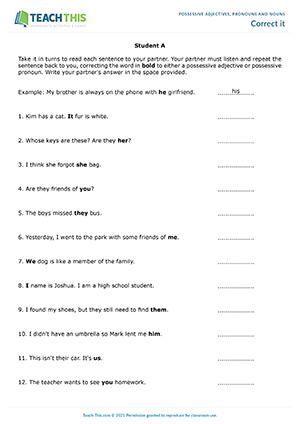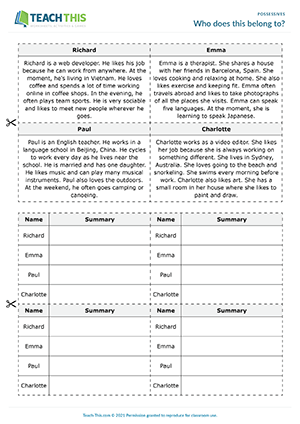Possessive Adjectives, Pronouns and Nouns ESL Games, Worksheets and Activities
In this engaging set of possessive adjective games, students play a guessing game, memory game and matching game where they make sentences with his, her, and their. First, students play a guessing game about who the objects on the cards belong to. Next, students take it in turns to turn over a picture card (showing who owns the object) and a possessive adjective card. If the cards match, the student makes a sentence with the possessive adjective, e.g. 'It's his bicycle'. The student then keeps the two cards and has another turn. The student with the most pairs of cards wins the game. Next, one student takes the picture cards and the other two students take the possessive adjective cards. The student with the picture cards turns over the top card, shows the card to the two students and says 'It's...' The two students then race to find the correct possessive adjective and give it to the student, completing the sentence at the same time, e.g. 'It's their house'. The first student to do this keeps both cards. The student with the most pairs of cards at the end of the game wins.
In this free possessive adjectives game, students create true sentences about themselves and others by arranging possessive adjective, noun, and predicate cards into sentences. In groups, students have ten minutes to make true sentences about themselves and others by arranging the cards into sentences. When the time is up, groups read out their sentences in turn, scoring one point for each true or believable sentence. The group with the most points wins the game.
In this rewarding possessive adjectives game, students play Connect Four by completing sentences with my, your, his, her, its, our and their. Players take turns choosing a square and completing the sentence with an appropriate possessive adjective, e.g. 'James is driving his car.' The third student checks the answer sheet. If the possessive adjective is correct, the player marks the square with an 'O' or an 'X' accordingly. It is then the other player's turn to choose a square. The first player to get four squares in a row wins the game. If that is not possible, the player with the most squares wins. When a group has finished, they play Game Two and the students swap roles, giving the third student a chance to play.
This comprehensive possessive adjectives worksheet helps students learn and practice a variety of possessive adjectives. First, students match sentence halves together and then underline the possessive adjective in each sentence. Next, students complete a table with the possessive adjectives. Students then underline the correct words in sentences. After that, students complete sentences with the correct possessive adjectives. Students then move on to put words in the correct order to create sentences, adding a possessive adjective to each sentence. Lastly, students complete each sentence using a suitable possessive adjective and a noun from a box.
In this fun possessive adjectives game, students play a true or false guessing game about favourites to practice the possessive adjectives: my, your, his and her. First, students write answers about their favourites, making five answers true and five false. In pairs, students then take it in turns to ask and answer questions about their favourites using the possessive adjectives my and your, e.g. 'What’s your favourite place?' The student who asked the question then decides if their partner is lying or telling the truth. The correct answer is revealed, and the student makes a note of the answer. Students score one point for each correct guess. The student with the most points at the end wins. Afterwards, students write sentences about their partner’s favourites using the possessive adjectives his or her, e.g. 'Her favourite place is the beach'. Finally, students tell a new partner or the class about their partner’s favourites using the possessive adjectives his or her.
In these two entertaining apostrophe games, students make nouns possessive by adding an apostrophe or apostrophe+s. Each student stands up with an apostrophe card and an apostrophe+s card. Students then play a game where they listen to nouns and hold up the correct possessive ending card to make the noun possessive. If any students hold up the wrong card, they sit down and are out of the game. The last student left standing is the winner. After that, in two teams, one player from each team comes to the front of the class and stands in front of an apostrophe card and apostrophe+s card. Call out a singular or plural noun at random. The first player to grab the correct possessive ending card to make the noun possessive scores a point for their team. The winning player then tries to make a sentence using the possessive noun. If the player does this successfully, their team scores an extra point. Students then take it in turns to come to the front of the class and play for their team. The team with the most points at the end of the game wins.
In this productive possessive nouns game, students play a Happy Families card game to practice possessive nouns. Each card contains a picture of an object and the name of the person who the item belongs to. There are also three small pictures at the bottom which are the other items the student needs to collect to complete the set. Students collect cards by taking it in turns to ask another group member for an item belonging to the set they want to collect, e.g. 'Do you have / Have you got Joshua's tennis racket?' If the group member has the card, they give it to the student. The student then gives the group member one of their unwanted cards in return, so students always have five cards. If the group member doesn't have the card, play passes to the next student. Students continue in this way until someone has collected a set of four cards. That student wins the round and scores a point. The students then shuffle the cards and deal them out again and so on. The student with the most points at the end of the game is the winner.
This useful possessives worksheet helps students learn and practice possessive adjectives and pronouns. Students begin by completing a table with missing possessive adjectives and pronouns. Next, students circle the correct words to complete the grammar rules for using possessive adjectives and possessive pronouns. Students then complete sentences with the correct possessive adjectives and possessive pronouns. Students then move on to circle the correct possessive adjective or pronoun for each sentence shown. Next, students complete sentences with a suitable possessive adjective or possessive pronoun. Lastly, in pairs, students take it in turns to make sentences using possessive adjectives or pronouns by pointing at the people and matching them with the items that they think belong to them, e.g. 'That is his skateboard', or 'The skateboard is his'.
In this insightful possessives worksheet, students practice possessive nouns and possessive pronouns. Students begin by writing the correct possessive noun using 's or s'. Next, students fill in gaps in sentences with the correct possessive pronoun. After that, students complete a text using possessive nouns and pronouns from a box and answer comprehension questions about the text. Finally, students write about where they live in response to the text using possessive nouns and pronouns.
In this fast-paced possessive pronouns game, students race to complete sentences with possessive pronouns. Students take it in turns to pick up a sentence card and read it to the other two students. The two students listen to the sentence and then race to grab the correct possessive pronoun card to finish the sentence. The first student to grab the correct card and say the possessive pronoun wins and keeps the two cards. The student with the most cards at the end of the game wins.
In this free possessive pronouns worksheet, students practice the possessive pronouns: mine, yours, his, hers, ours, yours, theirs. First, students read sentences and underline the possessive pronoun in each one. Students then write possessive pronouns in a table. Next, students complete sentences with possessive pronouns by circling the correct multiple-choice answers. Students then move on to complete each sentence with the correct possessive pronoun. After that, students rewrite sentences to include possessive pronouns. Lastly, students put words in the correct order to create sentences, adding a suitable possessive pronoun.
In this enjoyable possessive pronouns speaking activity, students play a memory game to practice possessive pronouns. Give each student a picture of an object and each pair a picture to share. The students then play a memory game where they try to remember who owns what object. Students go around the class telling each other the object they have, including the object they share with their partner. Students then join back up with their partner and try to remember who owns which object by writing the name of the person under the corresponding picture on their worksheet. Students then use the information to make sentences with possessive pronouns, e.g. 'The dictionary is his'. 'The sunglasses are mine'. 'The MP3 player is hers', etc. Each object is then called out in turn. The first pair to make a correct statement with a possessive pronoun scores a point. The pair with the most points at the end of the game wins.
In this handy possessive adjectives and nouns error correction game, students correct sentences by changing subject pronouns to possessive adjectives or object pronouns to possessive pronouns. The sentences on the worksheet contain errors. There are subject pronouns where the possessive adjectives should be and object pronouns where the possessive pronouns should be. The students' task is to take it in turns to read a sentence to their partner and have them correct the mistake. Their partner listens to the sentence and repeats it back to their classmate, correcting it with either a possessive adjective or possessive pronoun. The student then writes their partner’s answer in the space provided. The first pair of students to complete all the answers correctly wins.
In this creative possessives speaking activity, students practice language for talking about possessions. Students take it in turns to read the text on their biography card to the other group members who listen and summarize the important facts on their summary cards. Next, students take it in turns to give an object to the student with the matching biography card, explaining the reason for their choice, e.g. 'I think this is Richard's laptop because...' or 'This laptop belongs to Richard because...' When the students have placed all the cards, they are told that there should be three objects for each person. Students then review each person's belongings and make any necessary changes. When the groups have finished, they explain how they divided the possessions and why. Afterwards, review the correct answers with the class. As an extension, in their groups, each student writes down three of their favourite possessions on slips of paper and passes them to another group, who uses the target language to guess who wrote each possession and why.



